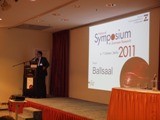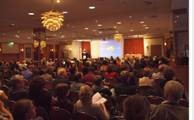More than 350 national and international scientists met in Berlin on 6 and 7 October 2011 for this year's National Symposium on Zoonoses Research. The focus was on zoonoses, infectious diseases transmissible between humans and animals, in their entire range. The spectrum of species covered ranged from mosquitoes, rodents, bats, hawks, pets and farm animals to humans.
In 62 lectures and 100 posters, new research results on the diagnosis, therapy, monitoring and risk assessment of zoonoses were presented from Germany as well as from Switzerland, the Middle East, Asia and West Africa. Due to global trade and travel, but also due to climatic changes, previously non-existent infectious agents can also reach our latitudes. The fact that one should be prepared for this and that appropriate diagnostic methods must be available was emphasized in various presentations, as was the importance of the question of the extent to which the mosquito species or rodents native to this area can transmit certain pathogens or have already had contact with them.
In addition to newly emerging pathogens and the now classic topics such as influenza, rabies, toxoplasmosis and antibiotic-resistant bacteria, the 2011 EHEC outbreak in Germany was also on the agenda.
This diversity of zoonoses clearly shows that close networking of human and veterinary medicine and other relevant disciplines is essential in this field of research. Dr. Karin Schwabenbauer of the Federal Ministry of Food, Agriculture and Consumer Protection also emphasised this in her welcome address: "It is undisputed that targeted interdisciplinary research is necessary to protect the population from zoonotic pathogens.



In addition, almost half of the contributions were presented by young researchers, who thus took the opportunity to discuss their results with experienced colleagues and establish contacts at an early stage. This year's symposium was again organised by the National Research Platform for Zoonoses, which is funded by the Federal Ministry of Education and Research (BMBF). All in all, the symposium was a successful event that is slowly but surely becoming a permanent fixture on the scientific calendar.



